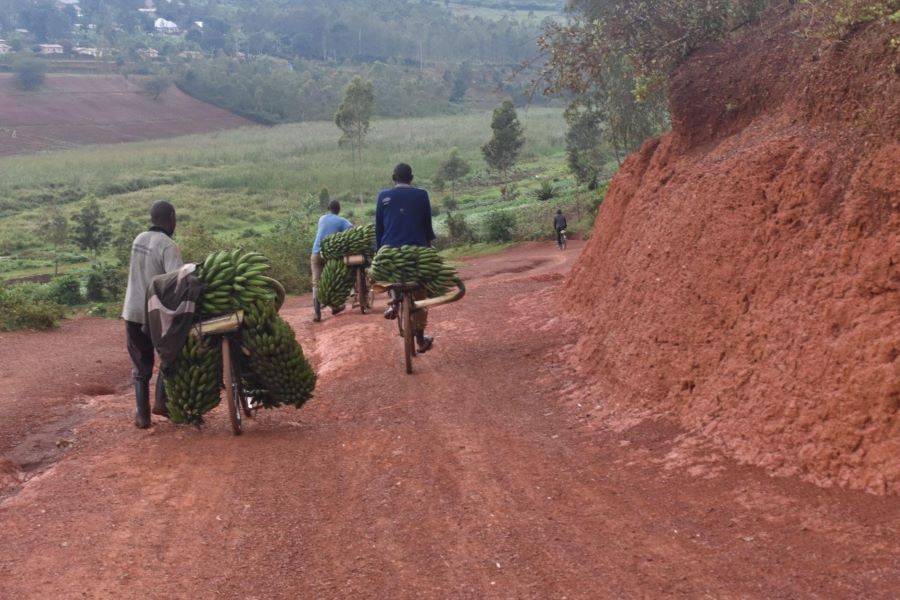
by Vedaste Nsengiyumva | 21 Jan 2022 | Africa, Culture, Identity, Kepler, Personal Reflections
People living in cities can have trouble valuing peasants from the countryside. But not all that is nice is made in cities! We depend on each other. Peasants carrying ‘matokes,’ a type of banana, to Kayonza market in eastern Rwanda (all photos by Vedaste...

by Urvashi Bundel | 10 Jan 2022 | Americas, Art, Culture, Donald Trump, Personal Reflections, Politics, Youth Voices
A year after supporters of ex-U.S. President Donald Trump attacked the Capitol Building, a young poet reflects on the American dream — or nightmare. A police officer stands on the steps of the U.S. Capitol before a prayer vigil marking the one-year anniversary of the...

by Deborah Charles | 5 Jan 2022 | Decoders, Economy, Politics, World
Sanctions have been a foreign policy tool since ancient Greece. Nations are increasingly using sanctions, even if they fail more than they succeed. Afghan protesters demand the unfreezing of central banks assets abroad, in Kabul, Afghanistan, 2 January 2022....

by Paul Spencer Sochaczewski | 22 Dec 2021 | Culture, World
A shared taste for sweets, unique fashions and world travel are similarities between the Hindu god Ganesha and Santa Claus, the rotund holiday figure. The Hindu god Ganesha and Santa Claus (Shutterstock) Some people (primarily me) have compared the generous Hindu...

by David Schlesinger | 20 Dec 2021 | China, Culture, Economy, Educators' Catalog, Politics, World
Social media memes are at the forefront of the latest form of passive resistance against China’s grinding work culture. “Lying flat” meme. I’m supposed to write a piece for News Decoder, but if I were a hip young Chinese, maybe I’d just “lie flat”...
So much reporting about China by Western journalists focuses on the Communist Party, human rights and economic growth, that it is refreshing to read an account by an “old China hand” that explores a quiet rebellion by Chinese youth expressed in purposefully ambiguous social media memes. Lying flat, touching a fish, being Buddha-like and saying “Whatever” sound innocuous enough, but they belie deep disenchantment among many young Chinese over “the relentlessness that has driven the economy to growth rates far faster than any developed country in the West,” as David Schlesinger puts it. Schlesinger’s account is all the more relevant as many young people outside China, fed up with COVID-19, are deserting the workaday world for a time out.
Exercise: Ask students to list their main grievances and what they can do about them.

by Daneese Rao | 16 Dec 2021 | Culture, Economy, Health and Wellness, Identity, University of Toronto Journalism Fellows, World
Millions of women try to lighten their skin although governments warn of health risks. Can anti-Black racism in the cosmetics industry be stopped? (Shutterstock/Mary Long) Social media manager Chand Bhangal constantly received negative comments about her complexion...

by Tira Shubart | 14 Dec 2021 | Space, Technology, World
A powerful new space telescope to be launched this month will look back more than 100 million years ago to when the first stars and galaxies formed. NASA technicians lift the James Webb Space Telescope with its 18-segmented gold mirror inside a clean room at NASA’s...

by Elizabeth Tina Fornah | 8 Dec 2021 | Africa, African Leadership Academy, Contest winners, Discovery, Educators' Catalog, Identity, Personal Reflections, Student Posts, Youth Voices
My father was the light in my life — until he left. A setback, for sure, but my mother and I persevered. Now I know courage bows to no obstacle. (Shutterstock/Anna Ismagilova) This story was co-winner of the first prize in News Decoder’s 10th Storytelling...
Elizabeth Tina Fornah of the African Leadership Academy relates the pain that so many young people experience when separated from a parent, but her story rises above self-pity as the narrator discovers courage in her refusal to bow to inevitable obstacles. “This is a painful, yet relatable reflection on the challenges of pursuing survival and the determination to succeed,” News Decoder Trustee Faith Abiodun said. “This writer has such a way with words that a difficult topic becomes almost enjoyable. Brilliant and gripping at the same time.” Throughout the highly personal account, Tina Fornah leverages the image of light to lend continuity as the narrator grows in strength and understanding.
Exercise: Ask students to describe their relationship with their parents and whether the expression “there is light at the end of the tunnel” captures their feelings as they contemplate eventually leaving home.

by Li Keira Yin | 6 Dec 2021 | China, Contest winners, Culture, Educators' Catalog, Human Rights, Identity, Politics, Student Posts, Thacher School, Youth Voices
Tibet’s many languages are under threat from Beijing’s policies and economic realities, putting cultural traditions and memories at risk. Tsupkhu Lama in Dharamsala, Himachal Pradesh, India in June 2019. (Photo by Li Keira Yin) This story won honorable...
Li Keira Yin of The Thacher School examines the difficulties that minority languages face surviving in Tibet without falling into the trap of concluding that it’s all the fault of the Communist Party leadership in Beijing when economic pressures in a globalized economy are part of the explanation. For her nuanced view, Yin draws from her unique perspective as someone raised in China who is studying in the United States. Her account of the complexities of language in Tibet started when Yin listened to her Chinese grandmother speak a dialect at home while speaking in Mandarin when picking up the phone. “I started wondering why dialects and minority languages have to be overpowered by Mandarin in China, and so I dug deeper,” Yin said. A lesson for other students struggling to understand how their lives fit into the bigger scheme of things.
Exercise: Ask students to discuss when it’s important for authorities to protect minority languages.

by Li Keira Yin | 29 Nov 2021 | China, Discovery, Eyewitness, Identity, Personal Reflections, Politics, Student Posts, Thacher School, Youth Voices
Curious about my family’s roots, I visited a remote region of China where minority Uighurs celebrated and laughed despite repression and a pandemic. Uighur Women in Procession at Sunrise, Kashgar, July 2021 (All photos by Li Keira Yin) I took these photos on a...










